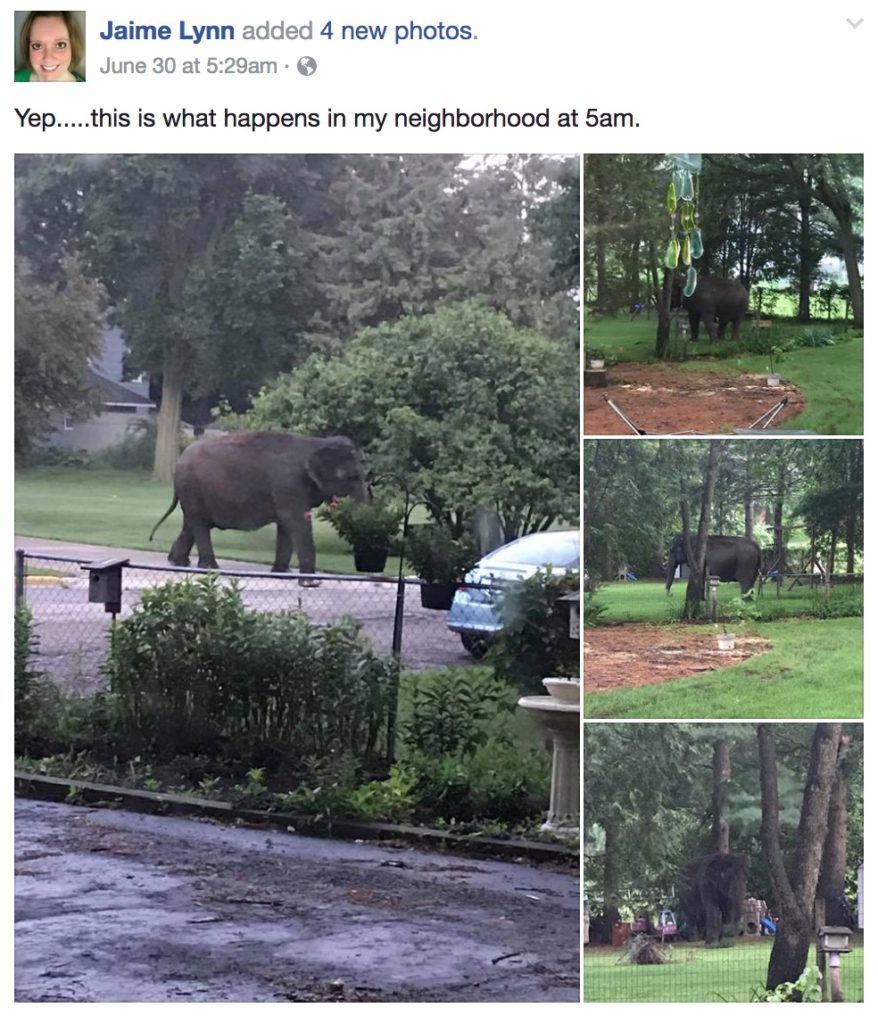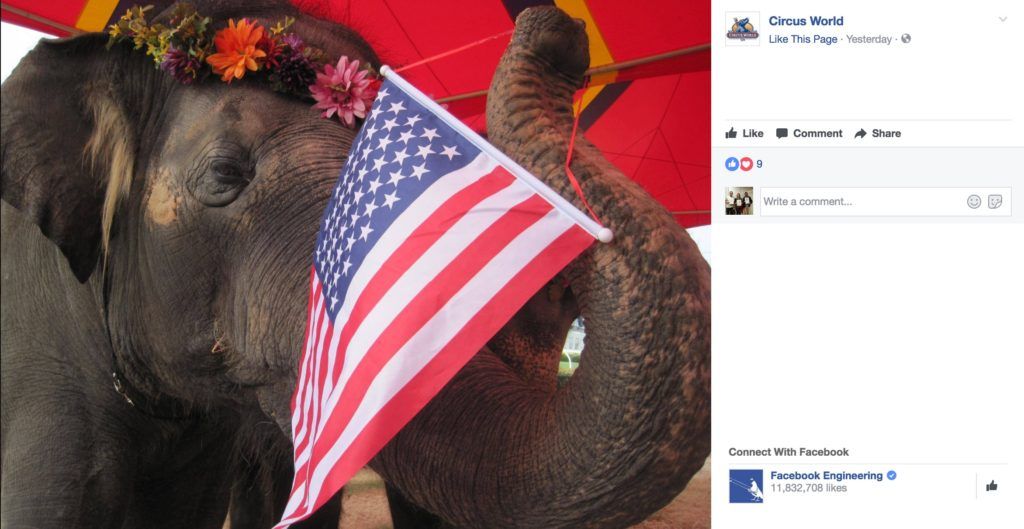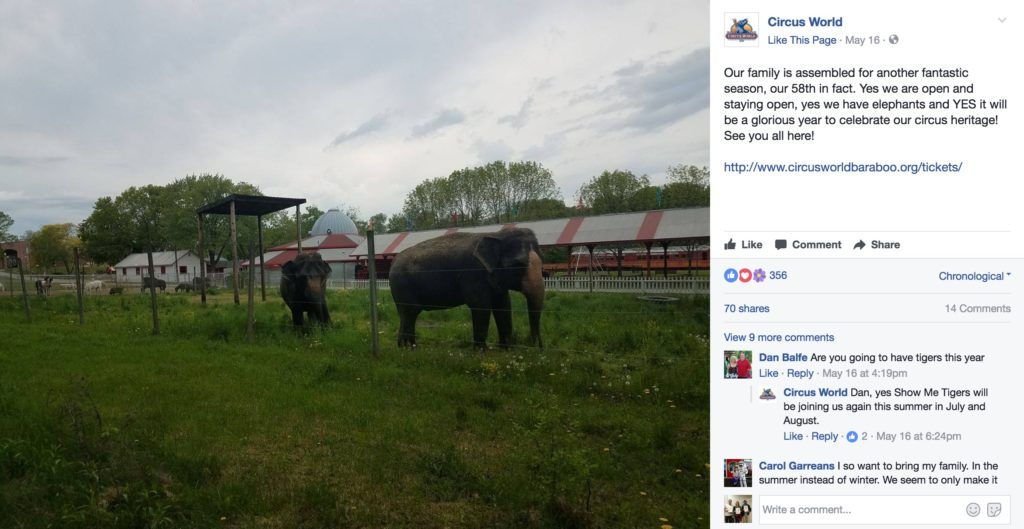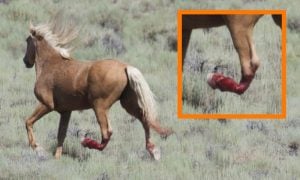While many Americans were getting ready to celebrate Independence Day, two elephants at Circus World in Baraboo, WI decided to claim their own freedom.
On Friday morning, an 8,400-pound Asian elephant named Kelly escaped from the circus with the help of her friend, Isla. Using her trunk, Isla picked the lock on her enclosure, detaching several nuts and bolts. Although Isla stayed behind, this helped her companion Kelly make a break for freedom.
Kelly entered a nearby neighborhood, and residents spotted her early in the morning eating the surrounding vegetation. Police contacted the circus and Kelly’s trainer came to lead her back to the enclosure.
Elephants escape highlights larger issue of captivity

Local resident finds Kelly, an elephant from Circus World, walking around her neighborhood. Screenshot from Jaime Lynn’s Facebook page.
Initial reporting by CNN and their light-hearted interview with circus director Scott O’Donnell put a humorous spin on the incident. They explained that Kelly escaped simply because she was hungry and Isla undid the enclosure latch because she is attracted to shiny things. However, the fact that elephants are smart enough to escape is evidence they shouldn’t be put in enclosures or used for human entertainment in the first place.
Elephants demonstrate intelligence, compassion
Studies consistently show that elephants are not only one of the most intelligent animals on Earth, they also express empathy for others. This empathy doesn’t just extend to their own species. Earlier this year, an elephant ran to save a man who appeared to be drowning in an elephant nature park in Thailand, pulling him out of the water with her trunk. It shouldn’t come as a surprise that Isla would want to help her friend Kelly.
Kelly keeps trying to leave captivity to be free

Screenshot of an elephant at Circus World in Baraboo, WI.
Whether Kelly really was just hungry and Isla just accidentally opened the enclosure is something we can never know for sure; but according to Animal Defenders International, this isn’t the first time Kelly has escaped. She and three other elephants also got away when she was performing with a different circus in Charleston in 2014.
Intentional or not, using animals like elephants for entertainment often exposes them to unnatural and cruel conditions. You don’t have to be a mind reader to realize most animals kept in captivity aren’t exactly happy.
On the surface, circuses like the one in Baraboo may seem entertaining and fun. Looking more closely, though, it’s not hard to see how problematic the situation is for animals like Kelly and Isla. In the process of training animals, riding them, transporting them between circuses, and performing in front of large audiences, animals are often mistreated, frightened, forced to do things they don’t want to do, and kept in unnatural conditions.
Elephants live longer, healthier lives in the wild

Screenshot of elephants at Circus World in Baraboo, WI.
According to the president and co-founder of the Performing Animal Welfare Society (PAWS), Ed Stewart, keeping elephants in captivity causes numerous health problems, including foot disease, arthritis, obesity, and abnormal repetitive behaviors such as swaying and head bobbing. What’s more, studies show elephants kept in captivity live less than half as long as wild elephants.
Elephants in captivity are often exposed to inherently cruel conditions

Screenshot of elephants performing at Circus World in Baraboo, WI.
The circus may seem commonplace in Baraboo, where the Ringling brothers began their cruel enterprise in 1884, but tradition shouldn’t trump animal rights. Many are shutting down circuses now because of the inherently cruel nature of training and storing the animals.
The Ringling Circus shut down in May, 2017 after they came under intense fire for the cruel way they treated animals. They’d captured about 50 percent of their elephants from the wild and trained them using electric prods and bullhooks. New York City went even further, banning exotic animals in circus completely in 2017 as well.
Hopefully, Kelly’s escape will help shed light on the issues facing circus animals and lead to her eventual freedom. In 2017, senators reintroduced The Traveling Exotic Animal and Public Safety Protection Act (TEAPSPA), also known as HR 1759. If adopted, the amendment would prevent the use of wild animals in traveling performances, including circuses.






